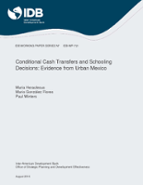Conditional Cash Transfers and Schooling Decisions: Evidence from Urban Mexico
Date
Aug 2016
Using administrative data from the urban Mexican Oportunidades program, this paper analyzes why poor households choose less education for their children, even when offered financial compensation for school attendance. Each school year, half of recipients forgo income for which they are eligible by failing to send children to school. Using a random effects probit and fractional response model, the analysis provides strong evidence that the poorest households, those with more dependents and high school students, recipients with limited education, and those living in large urban areas are less likely to have their children attend school and thus receive partial payments.



